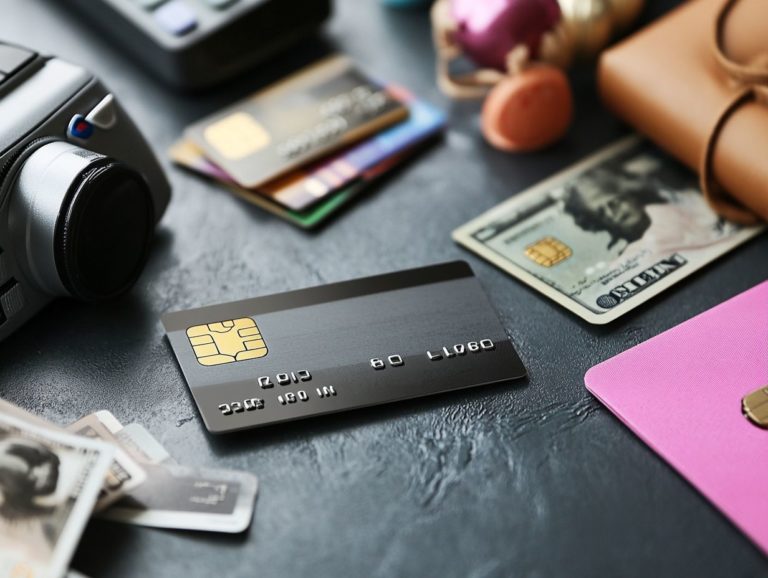Yearly Fees: Are Rewards Cards Worth It?
Rewards cards present an exceptional opportunity to transform your everyday spending into valuable perks. Don’t miss out on amazing rewards!
With many options and features available, it’s crucial to grasp their true implications. This article will help you decide if these cards are right for you.
This article delves into the various types of rewards cards, weighing their advantages and disadvantages, while also scrutinizing associated costs like annual fees and interest rates. Ultimately, it will guide you in assessing whether these cards suit your spending habits and provide insightful tips to help you maximize your rewards, ensuring you make informed financial decisions.
Contents
- Key Takeaways:
- Understanding Rewards Cards
- Pros and Cons of Rewards Cards
- Calculating the Cost of Rewards Cards
- Determining if Rewards Cards are Worth It
- Maximizing Rewards Card Benefits
- Common Questions About Rewards Cards
- What are yearly fees for credit cards?
- Are rewards cards worth the yearly fees?
- What types of rewards can I earn with a rewards card?
- Do rewards cards with higher yearly fees offer better rewards?
- Can I negotiate or waive the yearly fees for my rewards card?
- Are there any alternatives to rewards cards with yearly fees?
Key Takeaways:

- Rewards cards come in different types, each with unique benefits and drawbacks.
- Keep an eye on annual fees and interest rates to maximize your savings!
- To determine if rewards cards are worth it, assess your spending habits and learn how to effectively maximize rewards.
Understanding Rewards Cards
Understanding rewards cards is essential for cardholders aiming to get the most from their money while navigating the vast array of options in the market. These cards typically offer enticing incentives like travel rewards and cash back, significantly enhancing your purchasing power.
By leveraging membership benefits and loyalty programs, you can optimize the value you derive from your spending. With numerous credit card companies showcasing unique perks and bonuses especially for frequent travelers grasping the intricacies of these rewards cards enables you to make informed financial decisions and secure better overall value.
What are Rewards Cards?
Rewards cards are specialized credit cards crafted to offer you an array of enticing incentives, often manifesting as points earned, cash back, or travel rewards.
These cards present a wealth of benefits, perfect for those looking to elevate their spending strategy. By using them for your everyday purchases, you can effortlessly accumulate points that later translate into exciting rewards.
Most rewards cards operate by assigning specific rates of return on your purchases, with variations depending on the category. For instance, you might find that dining and travel expenses yield higher rewards compared to everyday grocery shopping or gas.
The types of rewards you can earn are wonderfully diverse, ranging from merchandise and gift cards to exclusive travel experiences. Many popular options include cards issued by major banks, tailored for frequent travelers, or cash-back cards that return a percentage of your spending, making them ideal choices for the discerning shopper.
Types of Rewards Cards
You ll find a variety of rewards cards at your disposal, each designed to align with different spending habits and preferences. There’s a card for just about everyone, whether you’re drawn to cash back, travel rewards, or hotel perks.
Cash back cards are particularly enticing for the everyday shopper. They give you a percentage back on your purchases, making every dollar you spend feel like it counts a little more.
If you’re a frequent flyer, travel rewards cards are your ticket to earning points that can be redeemed for flights, hotel stays, and car rentals, all of which can significantly enhance your travel experiences.
For those who often find themselves at certain hotel chains, hotel cards offer unique benefits, such as complimentary nights or room upgrades. And if your spending leans toward dining or gas, specialized rewards cards can help you maximize returns in those specific categories, allowing you to create a financial strategy that truly reflects your lifestyle.
Pros and Cons of Rewards Cards
When evaluating rewards cards, it s essential to carefully weigh the pros and cons, as these choices can profoundly influence your financial decisions and overall rewards strategy.
On one hand, rewards cards present an array of enticing benefits, including travel perks and cash back options that can enhance your spending experience. On the other hand, many of these cards come with annual fees and necessitate meticulous management of your credit utilization that is, how much of your available credit you use. This balance is key to maximizing your benefits while avoiding unnecessary costs.
Advantages of Rewards Cards

Rewards cards offer valuable rewards and enticing sign-up bonuses that can enhance your money management tools.
Many rewards cards provide unique opportunities for accumulating points, which can be redeemed for travel, merchandise, or cash back. Some cards allow you to earn double or even triple points on categories like dining or groceries, helping you maximize savings on everyday expenses.
Membership perks such as access to airport lounges or concierge services can elevate your experience, making these cards invaluable companions during travels. Plus, substantial initial sign-up bonuses can enable you to enjoy perks like a free flight or hotel stay just by using the card for a few months. This turns your card from a mere payment method into a strategic asset.
Disadvantages of Rewards Cards
Despite their appeal, rewards cards come with drawbacks, including potential annual fees and the risk of falling into debt if not managed properly.
You may feel tempted to overspend to rack up points or cashback, leading to ballooning balances that spiral out of control. If you don t pay off the balance monthly, those alluring rewards can quickly become a financial burden due to high-interest rates.
There’s also a risk of developing a negative credit history from missed payments or too much credit usage. Understanding these pitfalls can save you from unexpected surprises before diving into the world of rewards cards.
Calculating the Cost of Rewards Cards
Calculating the true cost of rewards cards is crucial for savvy shoppers like you who seek to optimize financial decisions. It’s not just about the shiny perks; you must consider annual fees and interest rates to make informed choices.
Annual Fees
Annual fees vary widely among rewards cards, playing a pivotal role in your decision-making process.
Typically, these fees come as a flat rate you pay each year, ranging from a modest $20 to a staggering $500, depending on the perks offered by the card. These fees often include access to premium features such as higher reward rates, exclusive travel perks, and enhanced customer service.
If you travel frequently or spend significantly in specific categories, the benefits can outweigh the cost of the annual fee. Some cards even waive the annual fee for the first year, so it s essential to evaluate the overall value and potential rewards before you commit.
Interest Rates
Interest rates associated with rewards cards can impact your financial health, especially if you don’t pay off your balances in full each month.
Understanding how these interest rates function is essential; higher rates can quickly diminish any benefits from rewards. Carrying a balance can overshadow the value of rewards points earned, making it crucial to monitor how much of your available credit you re using.
For many, maintaining usage below 30% is a sound practice for sustaining a healthy credit score. Therefore, grasping the implications of interest rates on your financial commitments is vital before enrolling in a rewards program.
Determining if Rewards Cards are Worth It

Determining whether rewards cards are a worthwhile investment requires careful consideration of several key factors. Evaluate the spending requirements alongside the potential redemption value of your earned rewards.
Explore your options today and find the rewards card that suits you best!
Factors to Consider
When evaluating rewards cards, you need to consider several key factors, such as your spending habits, preferred loyalty programs, and how your credit score may affect your eligibility.
Your lifestyle like how often you travel and what you usually buy plays a crucial role in identifying the rewards card that s the perfect fit for you. Understanding the differences between cash back and travel points can greatly influence the benefits you receive.
For example, if you frequently dine out, you might want a rewards card that offers higher points for every dollar spent at restaurants. On the other hand, if you re a traveler, look for cards with strong airline partnerships.
Don t overlook the importance of introductory offers and ongoing rewards structures. Striking the right balance between immediate rewards and long-term benefits can lead to a much more satisfying experience with your selected card.
Evaluating Your Spending Habits
Evaluating your spending habits is essential when selecting the right rewards card, as it can truly shape whether cash back or travel rewards will provide you with the most significant benefits.
For example, if you frequently shop at grocery stores or fill up at gas stations, choosing a cash back card could deliver impressive returns in those categories.
On the other hand, if you re a traveler who often books flights or hotels, a card featuring travel rewards may be more beneficial, allowing you to earn points for every dollar spent, which can quickly accumulate into free trips.
Consider how often you use your credit card for daily expenses; a savvy spender recognizes that aligning your card choice with your lifestyle can lead to more advantageous rewards.
Understanding annual fees is also crucial for maximizing the value of the card. Furthermore, exploring redemption options can enhance your experience.
Maximizing Rewards Card Benefits
Maximizing the benefits of your rewards card demands a strategic approach, coupled with a keen understanding of how to effectively redeem points. By leveraging credit card perks wisely, you can unlock maximum value from your rewards.
Tips for Maximizing Rewards
To truly maximize the rewards from your card, focus on redeeming points with intention and fully embracing the travel perks available through loyalty programs.
This means diving into the details of various reward structures and choosing cards that suit your unique spending habits.
For example, by making the most of bonus categories, you can significantly enhance your point accumulation many cards offer elevated rewards for specific purchases, such as dining or groceries.
Think about transferring your points to partner airlines or hotels; this often unlocks greater value for your rewards. Engaging with exclusive offers and keeping yourself informed about promotional events can further elevate your earning potential.
Remember, using your rewards wisely not only enriches your travel experiences but can also lead to impressive savings.
Common Mistakes to Avoid

Avoiding common mistakes with rewards cards can significantly enhance your experience and help you maximize your financial benefits.
Many users often overlook critical factors like annual fees, which can quickly diminish the perks of earned rewards if not managed wisely. Mismanaging credit utilization is another frequent pitfall that could negatively impact your credit score.
To navigate these challenges effectively, it’s essential to regularly review your statements to track your spending patterns and stay aware of due dates.
Setting reminders to pay off your balances in full each month is also a smart move, as it helps maintain a healthy credit utilization ratio and keeps those pesky interest charges at bay.
By using these smart strategies, you can truly enjoy all the fantastic benefits your rewards cards offer!
Common Questions About Rewards Cards
What are yearly fees for credit cards?
Yearly fees are charges that credit card companies impose on cardholders for the privilege of using their card. These fees can range from $50 to several hundred dollars and are typically due once a year.
Are rewards cards worth the yearly fees?
Your spending habits and the card’s rewards determine this. Regularly using the card can make the benefits worth the annual fee.
What types of rewards can I earn with a rewards card?
Rewards cards offer cash back, points, miles, and discounts. Some even come with bonuses like travel insurance and access to airport lounges!
Do rewards cards with higher yearly fees offer better rewards?
Not always! Some premium cards provide unique benefits. However, think about your spending habits to see if those perks are worth the higher fee.
Can I negotiate or waive the yearly fees for my rewards card?
Yes, you can try to negotiate your yearly fee. If you have a good credit score and have been a loyal customer, reach out to your credit card company and ask for a fee reduction!
Are there any alternatives to rewards cards with yearly fees?
Absolutely! There are cards that offer rewards without any fees. They might have fewer perks, but they can still be a great choice if you want to avoid annual charges.






